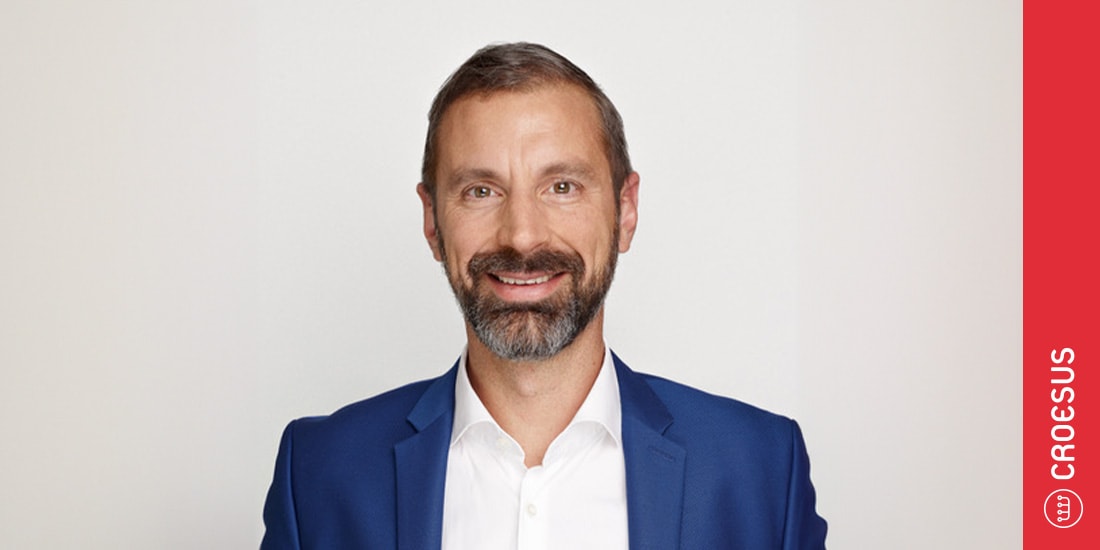
19 Mar The Wealth Mosaic talks to Romain Faraut about Croesus’ expansion into Europe
In this series, we interview senior executives from leading wealth management firms, solution providers, and WealthTech influencers to learn more about them, their journey, their perspectives on the market, and how they see the future of wealth management.
For this issue of The Wealth Mosaic Talks To (TWMTT), we talked to Romain Faraut, Head of Business Development for Croesus Switzerland, and asked him to share his view on why, in today’s market, wealth managers and firms need access to better portfolio rebalancing tools.
Nice to meet you. Can you first tell us (and our readers) a bit about yourself, and your career to date?
I began my career as an IT consultant for Swiss private banks back in the late 1990s, helping them to become certified and ready for the year 2000, and to integrate the Euro into their systems. Over time, I became more interested in the functional side of the business and, after extensive training, I obtained the qualification of Certified Wealth Manager. This allowed me to work as a relationship manager for sophisticated clients in a Geneva-based private bank for over a decade.
Capitalising on both sides of my experience – the technical side and the commercial aspect – I then became a management consultant in 2021. The projects I worked on were focused on helping modernise the wealth management industry, front to back. During my time in consulting, I was fortunate to work with a variety of banks and wealth management companies.
Where are you based?
I am based in Geneva, but I cover the whole Swiss market and its financial hubs.
What’s your main focus in your current role?
My primary objective is to develop the Swiss market for Croesus, and to act as a bridgehead for this North American WealthTech company as it looks to extend its reach into Europe. The first steps are to reconnect with my extensive network of contacts and players in the wealth management sector. The idea is to adapt and demonstrate the clear and compelling benefits (both for banks, and for bank’s clients) that our next-generation portfolio rebalancing solution has to offer.
Sounds interesting. So, for those who don’t know who Croesus is, can you tell us who you are, what you do, and how you are different?
Croesus is a Canadian WealthTech with over 35 years of success, whose values are fully aligned with the Swiss wealth management industry. Our portfolio management and rebalancing solutions are already in use by over 15,000 daily users, who collectively manage over 1,000 billion Swiss Francs in assets.
Why have you chosen to make the move into Europe now, and why choose to focus on Switzerland initially?
Croesus spent three years doing extensive research and analysis of the European wealth management market, supported in their market analysis by two well-known consulting firms that specialize in the wealth management space. Looking to expand into Europe is a pretty classic move for a North American company. We chose to focus on Switzerland as the first country to target because of its advanced wealth management industry.
What are the issues the marketplace has around portfolio rebalancing? How have these issues arisen? How do clients describe their problems in this area?
Rebalancing is often seen as a simple and secondary function in a Portfolio Management solution (PMS), providing limited support for portfolio managers’ needs with regard to their day-to-day tasks (e.g., taking into account currency hedging, managing non-standard customer preferences) and current customer expectations (personal convictions, tax-efficient portfolio management), thus limiting business opportunities.
To be truly effective, any solution must be based on human-driven automation which allows for scalability and, in turn, value creation and cost reduction in managing customer portfolios. This opens up the possibility of serving new customer segments such as affluent investors.
It should also free up valuable time of any investment team from Excel-driven, manual tasks, meaning they can concentrate on more value-added actions that directly benefit their clients.
What type of clients do you tend to work with? Why are they typically looking for a portfolio management solution?
We work with private banks and the wealth management divisions of large international banks to help them enhance and simplify their complete discretionary portfolio management process. The banks’ clients also benefit from the solution through the quality and personalisation with which the bank manages their assets. A win-win.
What are the easy wins when it comes to improving the portfolio management process?
Easy wins include an 80% elimination of repetitive tasks so that the portfolio management team can focus on tasks that add value to end clients.
By having a robust and flexible tool, wealth managers can move away from the one size fits all approach, so that the offering for each client really is customized to their specific needs. It’s not just a marketing gimmick. It’s something that delivers real value that is appreciated by the end client.
What are your aspirations for the Swiss market for this year? What do you see as the major challenges the industry is struggling with generally?
Wealth managers need a detailed understanding of clients’ situations, and to be able to leverage client data to deliver tailored investment services. The next generation of clients needs new angles of approach, at the same time, they want to leverage the heritage of excellence that the Swiss wealth management industry enjoys.
If you had a magic wand and could change ONE thing in the industry this year, what would it be, and why?
I would encourage people to think positively and stay focused on Switzerland’s unique positioning in the global wealth management space, rather than be distracted by the ever-changing geo-political environment which can be considered as the new normal.
About the interviewee:
https://www.linkedin.com/in/romainfaraut/

